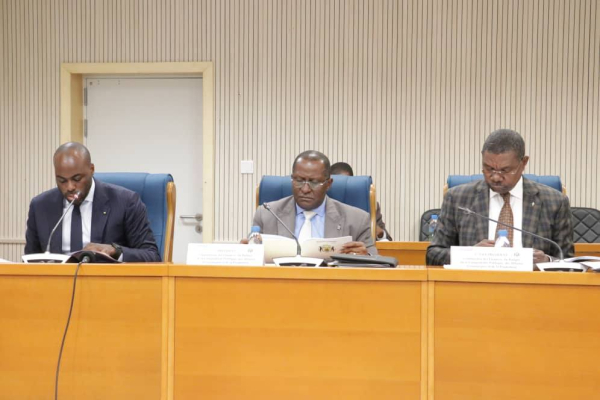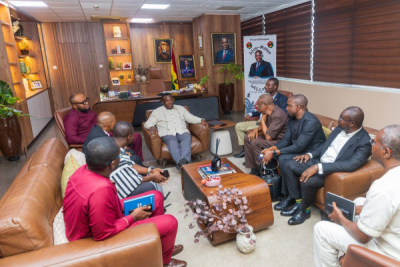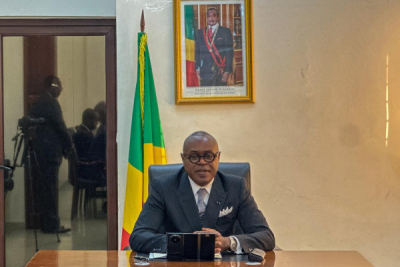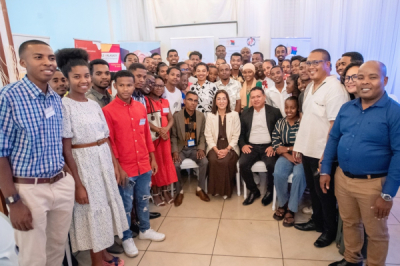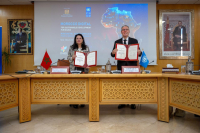
Public Management (599)
Madagascar has appointed a new minister to lead its ongoing national digital transformation strategy. The young expert is tasked with modernizing government administration and enhancing the country's overall connectivity.
Mahefa Andriamampiadana was appointed Madagascar’s Minister of Digital Development, Digital Transformation, Posts, and Telecommunications on Tuesday, Oct. 28. His appointment is part of the new 29-member “Re-foundation” government.
Andriamampiadana succeeds Tahina Razafindramalo, who held the post for several years and launched several key projects to modernize the country’s digital sector.
The new minister is relatively unknown to the public and has maintained a low national profile. Available information suggests he has solid experience in the private tech industry. He reportedly served as a senior IT strategy executive at Exo-S for three and a half years and previously held roles at Microsoft 365, Skyone Television and Radio Général, Compurweb, and Communication Network Corporation, covering operations management and executive leadership.
Andriamampiadana takes office as Madagascar seeks to strengthen its digital infrastructure and expand Internet access. Despite progress, connectivity remains costly and uneven: mobile Internet currently accounts for 15.5% of monthly GNI per capita, far above the 2% threshold recommended by the International Telecommunication Union (ITU).
The minister’s priorities include expanding the fiber-optic network, digitalizing public services, implementing a national digital identity system, and modernizing postal services. To meet these challenges, he will need to mobilize a dynamic ecosystem of private firms, telecom operators, startups, and international partners, collaboration on which Madagascar’s digital transformation depends.
Samira Njoya
-
Gabon boosts 2026 digital budget by 156% to 82B CFA francs
-
Funds target infrastructure, literacy, and e-governance expansion
-
Country scores low in cybersecurity despite digital policy gains
Gabon’s Ministry of Digital Economy, Digitalization, and Innovation has announced a budget of 82 billion CFA francs for 2026, representing a massive 156.2% increase from the 32 billion CFA francs allocated in 2025. Minister Mark-Alexandre Doumba presented the budget to the National Transition Assembly on Sunday, Oct. 19, 2025.
The significant increase "reflects the government’s commitment to accelerating the country's digital transformation through the strengthening of the digital entrepreneurial ecosystem, the deployment of digital infrastructure, and the promotion of a genuine digital literacy across the country," the ministry said in a statement released on Tuesday, Oct. 21.
While the statement did not specify the projects planned for 2026, the government has launched several digital infrastructure initiatives in recent months. These include signing an agreement with an American technology company to construct a national data center. Private partners such as Cisco, Tech 41, Visa, Huawei, Moov Africa Gabon Telecom, and Afrastructure SAS have also been approached. Discussions have focused on expanding the national fiber optic network, strengthening universal service, telecom infrastructure sharing, 5G deployment, and connecting the country to a new submarine cable.
In digital transformation policy, the government recently issued an ordinance that mandates public administrations to digitize their services, interconnect their systems, and fully integrate the national private sector to establish digital sovereignty.
Gabon is currently ranked 121st out of 193 countries on the United Nations E-Government Development Index, scoring 0.5741 out of 1. This places it above the average for Central Africa (0.3354) and Africa (0.4247), but below the global average (0.6382). The country’s lowest score, 0.3188 out of 1, was recorded in the online services indicator, while its highest, 0.8263, was in the telecom infrastructure indicator.
This result aligns with the International Telecommunication Union’s (ITU) 2024 ICT Development Index, where Gabon scored 76.1 out of 100, ranking 11th out of 42 African nations.
However, Gabon faces challenges in cybersecurity. The ITU’s Global Cybersecurity Index 2024 placed the country in the fourth and second-to-last category (Tier 4), with an overall score of 39.86 out of 100. While the country achieved the maximum score of 20 in the legal measures pillar, significant progress is still required in the areas of technical, organizational, and cooperation measures.
Isaac K. Kassouwi
- Ghana, Cisco discuss partnership for digital skills training
- “One Million Coders” targets certified youth in tech fields
- Plan includes digital centers, global tech firm collaborations
The Ghanaian government is exploring a collaboration with U.S. technology giant Cisco Systems for its "One Million Coders" program, an initiative aimed at equipping the nation's youth with digital skills. A Cisco delegation presented a partnership proposal to Samuel Nartey George, the Minister of Communication, Digital Technology, and Innovation, during a meeting last week.
While specific details of the proposed partnership were not disclosed, Cisco operates its own global training platform, the Cisco Networking Academy (NetAcad), established in 1997. NetAcad offers free or subsidized courses, both online and in-person, covering areas such as computer networking, cybersecurity, programming, Artificial Intelligence (AI), the Internet of Things (IoT), and cloud computing. The academy works with governments, universities, and organizations to provide globally recognized certifications, including the CCNA (Cisco Certified Network Associate).
During the meeting, Minister George reiterated that the "One Million Coders" program aims to train internationally certified professionals in high-demand fields such as AI, cybersecurity, forensic data science, and cloud computing. He also announced plans to establish digital centers in all 276 constituencies across the country, each equipped with approximately 50 computers, to ensure young people in rural areas have access to necessary equipment and internet connectivity for their training.
George stated that the government is actively seeking partnerships with major technology firms, including Google, Huawei, Microsoft, and AWS. The government had previously engaged with TikTok in June and, in September, initiated a collaboration with Code Racoon, a company backed by German partners, to train 350,000 young individuals. Discussions are also underway with local tech firm TECHAiDE to integrate its "Asanka" wireless device, an offline Local Learning Management System (LMS), into the training program.
Launched in April, the "One Million Coders" program is part of the government’s comprehensive plan to build a digitally competent workforce capable of supporting Ghana's transition to an innovation-driven economy. The GSM Association (GSMA) estimates that continued digital transformation across the agriculture, industry, trade, and transport sectors could create an additional 340,000 jobs by 2027, generating a total added value of 34.9 billion cedis ($3.24 billion).
The partnership is not yet finalized. Minister George invited Cisco to submit a formal proposal and a letter of intent to officially establish the collaboration, though no specific timeline was provided.
Isaac K. Kassouwi
- Twenty high-speed Internet sites launched under a $100 million digital project.
- The program aims to connect 76 rural sites nationwide by the end of 2025.
- Limited electricity access remains a major challenge in remote areas.
Congo’s Minister of Posts, Telecommunications, and the Digital Economy, Léon Juste Ibombo, announced on Monday, October 13, the activation of 20 high-speed Internet access points in rural areas. The initiative, unveiled during a visit by a World Bank delegation for the Africa region in Brazzaville, aims to democratize Internet access nationwide and reduce the digital divide.
“As of today, 76 connectivity sites have been built and equipped across the country. Of these, 20 are already connected to high-speed Internet, allowing residents in remote areas to go online in real time,” said the minister.
The rollout is part of the Digital Transformation Acceleration Project (PATN) and the broader Digital Strategy 2030. Co-financed by the World Bank and the European Union for $100 million, the PATN represents one of the largest investments ever made in Congo’s digital sector. The government has also contributed an additional $3 million to upgrade infrastructure, prioritizing 4G technology to ensure stable and efficient connections.
The government’s goal is to connect all 76 sites to 4G by the end of the year, creating new economic and social opportunities for rural communities in e-commerce, e-learning, and e-government.
Beyond infrastructure, the initiative seeks to narrow the digital gap between urban and rural areas and strengthen the state’s capacity to deliver efficient online public services. However, persistent challenges remain, especially limited access to electricity. According to the World Bank, 67% of the urban population has electricity, compared with only 12.4% in rural areas.
-
Nigeria to build $10B tech hub in Katsina State
-
Hub supports 3M tech talent plan, digital economy goals
-
$500M World Bank loan backs broadband expansion nationwide
The Nigerian federal government plans to build a $10 billion tech innovation hub in Katsina State, Communications, Innovation and Digital Economy Minister Bosun Tijani said on Monday.
Tijani announced the project during a meeting with Katsina State Governor Malam Dikko Umaru Radda. According to local media, Katsina is one of ten states selected to host the new hubs, with construction expected to begin before the end of next year.
The minister also outlined other federal projects for the state, including plans to expand satellite internet in underserved areas and scale up the federal program to train three million young tech professionals nationwide. The Katsina hub will serve as a base of operations for these trained workers.
Governor Radda said the initiative complements the state’s own digital agenda, citing the adoption of a Right of Way policy, a State Digital Law, the creation of a Digital Economic Zone, and the establishment of an ICT directorate. He added that his administration plans to extend fiber connectivity to all Local Government Areas (LGAs).
The project aligns with Nigeria’s broader digital transformation strategy, which places ICT at the heart of national development. The government aims to raise the ICT sector’s share of GDP to 22% by 2027.
To support this effort, the World Bank on September 30 approved $500 million in financing for Nigeria under the BRIDGE Project, a $1.6 billion initiative also backed by the African Development Bank (AfDB), the European Investment Bank (EIB), and the Islamic Development Bank (IsDB).
The program seeks to narrow the broadband gap in underserved regions by deploying about 90,000 kilometers of fiber-optic network. The infrastructure will be climate-resilient, renewable-powered, and built around seven national rings, 37 metropolitan loops, 77 regional networks, and multiple edge data centers.
Isaac K. Kassouwi
-
Madagascar launched the first cohort of the Skills4Job program to equip young people with key digital skills.
-
The initiative, aligned with the 2023–2028 Digital Strategic Plan, started with 51 participants in Toamasina.
-
The government aims to train 40,000 people by 2028 as part of broader efforts to reduce youth unemployment.
The Malagasy government launched on Thursday, October 2, the first cohort of the “Skills4Job” program, designed to equip young people with essential digital skills and improve their readiness for the labor market. The program began with 51 participants in the port city of Toamasina and will gradually expand nationwide.
According to Stéphanie Delmotte, Minister of Digital Development, Posts, and Telecommunications, the free training provides participants with the tools needed to face the challenges of tomorrow’s digital economy.
This initiative aligns with the country’s Digital Strategic Plan (PSN) 2023–2028, which aims to make Madagascar a key player in Africa’s digital economy through advances in telecommunications, e-government, and digital inclusion. The World Bank estimates that about 230 million jobs in sub-Saharan Africa will require digital skills by 2030 as the continent continues its digital transformation.
In September, the Minister of Technical Education and Vocational Training, Marie Marcelline Rasoloarisoa, announced plans to train 40,000 people in digital skills by 2028. Earlier, in February 2024, Madagascar signed a partnership agreement with the United Arab Emirates to train one million young people in new technologies.
Youth employment remains a major concern in Madagascar. According to Afrobarometer, more than four in ten Malagasy aged 18 to 35 were unemployed and actively seeking work in 2024. The study identified lack of adequate training or preparation (30%), lack of experience (27%), and mismatch between school qualifications and market needs (16%) as key barriers to employment.
• Algérie Télécom opens Sétif Skills Center to youth innovators
• Facility offers free AI lab, ICT training, expert workshops
• Part of nationwide plan to boost youth skills, digital strategy
Algeria's state-owned telecommunications company, Algérie Télécom, signed a framework agreement on Saturday, September 27, with the Directorate of Youth and Sports for the Sétif region. The national operator has committed to making its "Skills Center" available to young people, students, innovators, and emerging project developers in the region, which has an official population of 2.1 million.
"This creative structure will provide collaborative spaces, training workshops supervised by national and international experts, and an artificial intelligence laboratory free of charge, giving young people the opportunity to acquire skills and materialize their innovative ideas," the historical operator said in a statement on its Facebook page.
The Sétif Skills Center, inaugurated last February, is the first in a series of similar centers the government plans to open across several provinces to provide young people with free training in advanced technologies. Other centers have already opened in Annaba and Oran. These hubs offer training in fields such as Artificial Intelligence (AI), cloud computing, the Internet of Things (IoT), cybersecurity, and other information and communication technology (ICT) specialties.
This announcement follows a meeting approximately two weeks ago between Minister of Post and Telecommunications Sid Ali Zerrouki and Youth Minister Mustapha Hidaoui on strengthening cooperation between their departments. The ministers stressed the authorities' commitment to placing youth at the core of the national digital strategy by developing programs to enhance young people's skills, stimulate their creativity, and encourage their innovation capacity. They also underscored the importance of implementing concrete projects that leverage the technological expertise of the telecommunications sector while building on initiatives driven by youth establishments.
Isaac K. Kassouwi
• Morocco, OpenAI discuss partnership to boost national AI strategy
• Talks focus on research, innovation, and localized AI ecosystem
• Follows Mistral AI deal to build skills, startups, and safeguards
The Moroccan government is exploring a major collaboration with the U.S. artificial intelligence (AI) company OpenAI. The potential partnership was the central topic of discussion during a meeting between Amal El Fallah Seghrouchni, Morocco’s Minister of Digital Transition and Administrative Reform, and executives from the San Francisco-based firm. The meeting took place on the sidelines of the 80th U.N. General Assembly.
According to a ministry statement published on Facebook on Thursday, Sept. 25, the discussions with OpenAI focused on cooperation in research and innovation and developing an artificial intelligence ecosystem tailored to the unique characteristics of Moroccan society.
The Moroccan government has made AI a core pillar of its national digital transformation efforts, which are designed to accelerate social and economic growth. Through its "Digital Morocco 2030" strategy, the government aims to leverage AI's potential to quickly digitize public and private services, attract international tech players, support local startups, and develop necessary skills and infrastructure. The strategy also focuses on consolidating data registries, deploying use cases to improve services, and conducting multi-disciplinary reviews of the societal, legal, and economic implications of AI.
This push to build its AI capacity follows a deal signed on Sept. 12 between the ministry and French AI company Mistral AI. That memorandum of understanding aims to strengthen local AI skills through training, applied research, and knowledge transfer. It also seeks to stimulate the national ecosystem by promoting the growth of startups and industrial projects based on AI solutions tailored to Moroccan business needs. Finally, the Mistral partnership commits to promoting the ethical and inclusive use of AI, ensuring data protection and public trust.
Isaac K. Kassouwi
-
Government to launch Morocco Digital for Sustainable Development at UNGA
-
Initiative backed by UNDP to strengthen digital governance and AI adoption
-
Morocco ranks 4th in Africa on UN e-government index, above global average
Morocco will officially launch an Arab-African center of excellence in artificial intelligence and data science during the 80th United Nations General Assembly, which begins on September 23. Backed by the UN Development Program (UNDP), the Morocco Digital for Sustainable Development (D4SD) hub aims to promote inclusive digital transformation across Arab states and African regions.
The initiative stems from a memorandum of understanding signed in July between Morocco and the UNDP, on the sidelines of the National AI Forum. According to the UN agency, the partnership will help countries improve digital public services, encourage responsible AI use, and build institutional and regulatory systems to support digital transformation and sustainable development.
UNDP highlighted Morocco’s leadership in digital governance, AI, and data science. The country ranks 90th worldwide and 4th in Africa in the 2024 UN E-Government Development Index (EGDI), with a score of 0.6841 out of 1, above both the African and global averages. In September 2023, Morocco also launched its “Digital Morocco 2030” strategy to consolidate its progress and accelerate socio-economic development through digital innovation.
The initiative comes as digital benefits remain unevenly distributed across Africa. According to UNDP, countries still face systemic barriers such as weak infrastructure, limited AI capacity, low investment in digital innovation, and uncoordinated regulatory frameworks.
- Mozambique launches ThinkLab incubator to support digital startups
- Twelve firms in health, AI, transport, finance join first cycle
- Part of broader strategy for inclusive digital transformation by 2030
Mozambique's communications regulatory authority, INCM, has launched the ThinkLab, a new incubator designed to support local startups and entrepreneurs in the digital sector. The launch took place in Maputo and was attended by Communications and Digital Transformation Minister Américo Muchanga.
"A nation without innovation is a nation of dormant minds. ThinkLab is a laboratory for projecting digital solutions for the most urgent national challenges. It is also a collaborative platform where the private sector, academia, and the government plan and project the future we want, together," Muchanga said.
Twelve startups were selected for the first incubation cycle. They operate in various sectors, including health, transport, finance, IT, and AI. Through ThinkLab, the regulator aims to provide them with technical and regulatory support, resources, training, and mentorship. The initiative also facilitates connections with experts and investors. The goal is to ensure project viability, encourage access to funding, and build a collaborative ecosystem that brings together startups, businesses, universities, and regulators.
The INCM hopes the project will help drive digital transformation, a key priority for Mozambican authorities. To that end, the government launched the "Internet For All" initiative last March to democratize internet access by 2030. This effort is seen as "a fundamental pillar of the government's overall digital transformation strategy, creating an inclusive digital environment that will enable citizens, businesses, and public institutions to interact and innovate, thus contributing to the emergence of an accessible and inclusive digital economy."
According to pan-African investment firm Renew Capital, Mozambique's startup ecosystem is still in its early stages. However, the firm notes that the country's vast natural gas reserves, abundant mineral resources, and strategic geographical location make it a promising market to watch in Africa. The challenges mentioned include a regulatory framework still under development, inadequate infrastructure—particularly in internet connectivity—and a significant skills gap in technology professions.
Isaac K. Kassouwi
More...
• Cameroon launches digitalization program to modernize local governance
• 240 of 374 municipalities signed on; key challenges remain
• Goal: boost transparency, online services, and investment appeal
The United Councils and Cities of Cameroon (UCCC) unveiled its "Program for the Digitalization of Councils and Cities" (PDCV) in Yaoundé on Thursday, September 11. The initiative aims to modernize local governance by providing municipalities with shared digital tools and online services for citizens.
The PDCV is structured around four main pillars: a shared digital platform for municipalities and the UCCC, the creation of an integrated suite of digital services, enhanced digital skills for municipal staff, and program coordination and monitoring. The stated goal is to make local governments more transparent, efficient, and better connected with their constituents.
The project is part of Cameroon’s broader digital transformation strategy, which includes the gradual dematerialization of administrative procedures and the interconnection of public services. As part of this effort, 374 municipal websites have already been developed. However, for these sites to become fully operational, each municipality must sign a memorandum of understanding with the UCCC. So far, 240 municipalities have taken this step, while 134 have not yet signed, according to the association.
Ultimately, the PDCV is expected to increase the visibility of local governments, facilitate citizens' access to online administrative services, and make regions more attractive to investors. However, several challenges remain, including inadequate ICT infrastructure, a limited internet penetration rate of 41.9% as per DataReportal, a lack of skilled personnel, energy instability, and insufficient municipal financial resources. The program's success also hinges on the effective implementation of the General Code of Decentralized Territorial Collectivities, which allocates 15% of state revenues to decentralization.
Cameroon faces significant challenges in digital governance. According to the 2024 United Nations E-Government Development Index, the country ranks 155th out of 193, with an index score of 0.4294, well below the global average of 0.6382. This program represents a strategic opportunity to bridge this gap and firmly establish Cameroonian administration in the era of smart digital governance.
Samira Njoya
- Burkina Faso advances digital education through PACTDIGITAL initiative
- Plans include online platform, updated curricula, ICT equipment in schools
- Challenges remain: poor connectivity, limited training, equipment shortages
Burkina Faso is pushing forward with the integration of digital technology into its education system. The Digital Transformation Acceleration Project (PACTDIGITAL), led by the Ministry of Digital Economy, outlined its support for the Ministry of Secondary Education and Technical and Vocational Training on Wednesday, September 10.
The project's key initiatives include updating telecommunications and ICT curricula to better align with job market demands, launching an online learning platform, strengthening local skills in creating educational multimedia content, and providing digital equipment to scientific high schools in Ouagadougou and Bobo-Dioulasso.
According to Haoua Ouattara/Dama, the project coordinator, these actions aim to digitize core ministerial processes, modernize teaching practices, and pave the way for new digital-related careers. Boubacar Savadogo, the Minister of Secondary Education, stated that the support will help improve the quality of training and increase the number of skilled digital professionals.
The initiative is part of the Burkinabè government's broader digital transformation goals, which aim to leverage technology for key sectors, including education. For example, a project to develop 95 educational mobile applications was announced in February 2024. UNESCO believes that digital learning has the potential to expand access to education, improve learning outcomes, and equip students with the knowledge and skills needed to tackle 21st-century challenges.
However, the integration of ICT into Burkina Faso's education system faces several obstacles. A 2023 government assessment highlighted structural and technical challenges, including insufficient coordination among different stakeholders, a lack of widespread public awareness, and limited and expensive internet connectivity. The report also pointed to issues with cloud service functionality, low fiber optic coverage in educational institutions, a lack of adequate training, and a shortage of computer equipment and logistical materials.
Isaac K. Kassouwi
-
South Africa’s IT agency SITA is testing a government super-app to ease access to public services.
-
The “Citizen Super-App” will allow service requests, digital payments, identity verification, and real-time updates.
-
The project is still in pilot phase and faces hurdles, with 24% of the population offline in 2023.
South Africa’s State Information Technology Agency (SITA) has begun testing a government super-application designed to make public services easier to access. The platform, called the “Citizen Super-App,” was introduced by acting SITA chief executive Gopal Reddy during the 16th GovTech conference, held from September 8 to 10, according to local media.
Reddy explained that the app will let citizens access government services, track their requests, receive real-time updates and notifications, and interact with departments through self-service tools. It will also simplify identity verification, digitize administrative forms, integrate digital payment options, and enable smoother data sharing.
The project is part of South Africa’s broader digital transformation drive. In its 2025–2030 strategy, SITA highlights the modernization of government through technology as a central pillar, aiming for greater efficiency and transparency.
The strategy notes that this includes large-scale digital innovation, the use of artificial intelligence, and the rollout of new digital products such as the Citizen Super-App. Other priorities include modernizing government systems, expanding national connectivity, growing cloud and data center capacity, and improving cybersecurity through a centralized Cybersecurity Center (CSC).
The Citizen Super-App is still in its pilot phase, and officials have not disclosed when it will be fully launched. Its success will also depend on internet access and device availability, particularly in rural areas. According to the International Telecommunication Union, about 24% of South Africans were still offline in 2023.
Isaac K. Kassouwi
- Nigeria launches 1Gov Cloud to enable paperless governance by 2025
- Platform integrates secure tools for workflows, communication, and assets
- ICT sector seen reaching 21% of GDP by 2027
The Nigerian government has launched its 1Government Cloud (1Gov Cloud) platform to create a paperless administration across ministries, departments, and agencies (MDAs). This initiative is part of the country’s digital transformation goals, which aim for a fully digital government by the end of December 2025.
The 1Gov Cloud platform centralizes several digital tools to modernize governance. It includes GovDrive for secure, sovereign cloud-based file management and encryption; GovECMS to automate workflows and inter-agency interactions; GovMail for secure, government-only communication; GovE-Sign for legally recognized electronic signatures; and GovConference for encrypted video and audio conferencing. Other features include GovOTP for secure one-time password authentication, GovAsset Management for a unified registry of government assets, and GovCollaboration Tools for chat, document sharing, and inter-agency coordination.
"The paperless governance initiative will eliminate bureaucratic bottlenecks by streamlining approvals and inter-agency communication," said Wumi Oghoetuoma, the 1Gov Cloud Program Director, in comments reported by Nairametrics. "It will significantly cut costs associated with printing, storage, and distribution of physical files, while enhancing transparency and accountability in public service delivery."
Digital Economy Growth
This initiative underscores the Nigerian government's commitment to making digital technology a cornerstone of socioeconomic development, with the ICT sector's contribution to GDP projected to reach 21% by 2027. In recent months, the government has stepped up efforts to strengthen cybersecurity, train citizens and civil servants in digital tools, and expand digital infrastructure.
According to a joint study by the International Finance Corporation (IFC) and Google, Africa’s digital economy is expected to reach at least $712 billion by 2050, representing 8.5% of the continent's GDP. The GSMA, a global association of mobile operators, projects that e-government could also generate an additional 814 billion naira in tax revenue for Nigeria by 2028.
Isaac K. Kassouwi



